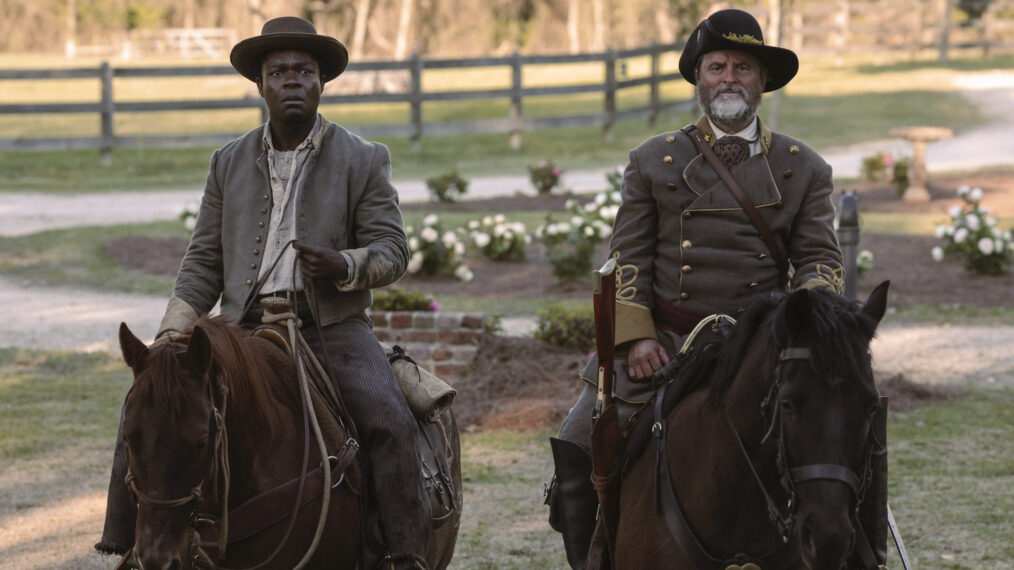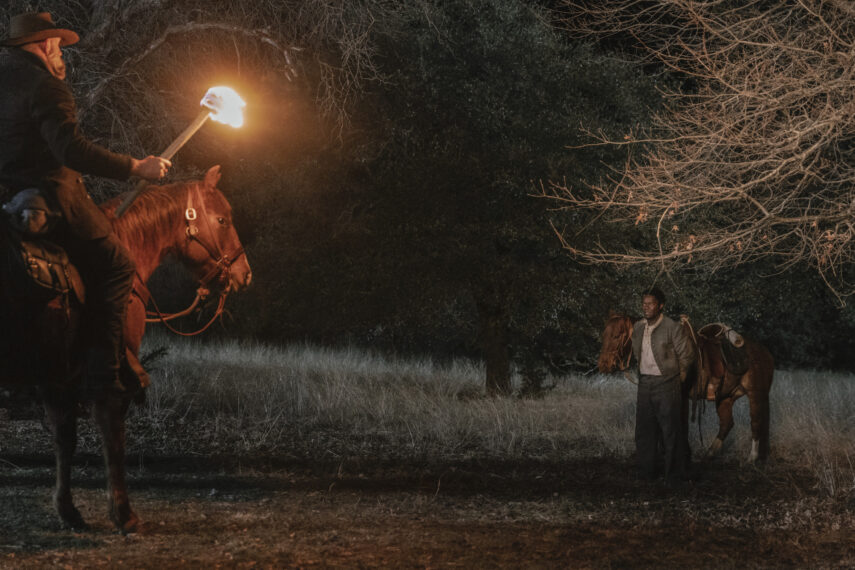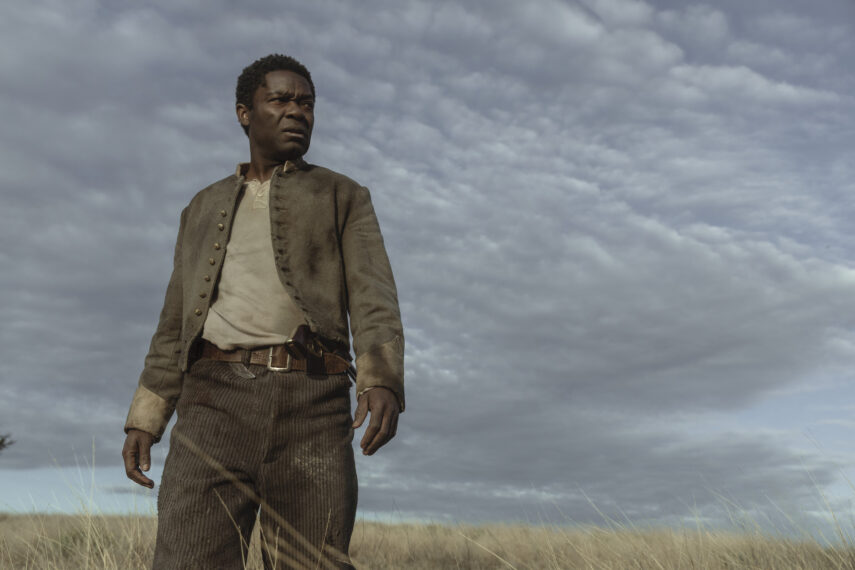‘Lawmen: Bass Reeves’ Premiere: Did That Card Game Really Happen?

Spoiler Alert
[Warning: The following contains MAJOR spoilers for the Lawmen: Bass Reeves series premiere, “Part 1.”]
Lawmen: Bass Reeves tells as much of the true story of Bass Reeves’ life as it can. The legendary lawman was the first Black U.S. Marshal west of the Mississippi, earning the title in the years following the Civil War and the abolition of slavery. Bass’ life is so storied, he’s said to have inspired The Lone Ranger character. But his road to notoriety started with extreme hardship, some of which are depicted in the Lawmen: Bass Reeves series premiere streaming on Paramount+ as of Sunday, November 5.
The premiere starts off with a bang — literally. We first see David Oyelowo‘s Bass as a Confederate soldier mid-battle in Pea Ridge, Arkansas in March 1862. While Bass was brought into the war as his slave owner, George Reeves’ (Perry Mason‘s Shea Whigham), valet, this scene shows he was forced to fight in this battle. It’s a bloody brawl between the Confederate and Union soldiers in the first minutes of the series, a fight that takes a heavy emotional toll on the central character but also plants the seeds for his escape from slavery.
A disagreement with Confederate officers after the battle prompts George to become a deserter, and he takes Bass home with him. There, Bass reunites with his lover/future wife, Jennie (played by Lauren E. Banks), in the slave quarters of George’s estate. With no one home to provide a warm welcome, the bitter and angry George gets drunk and calls Bass into the house later that evening. There, he shockingly offers Bass his freedom, and for much of this inebriated monologue you think he’s being genuine. But there was a catch to his offer: Bass had to win his freedom in a game of cards. It’s equal parts unsurprising and tragic when George cheats in the game, ripping Bass’ freedom away (or so he thought).
This foul move was Bass’ breaking point. He attacks George for the gross indignity, the last in a long string of degradation seen throughout the episode’s first half, and quickly makes his escape with Jennie’s blessing (given that they later marry, this isn’t goodbye forever). As Bass got further away from the Texas plantation on horseback, the expert gunman shot down three white men who threatened to return him to George (or worse).

Bass runs into trouble as he flees the Reeves plantation in Lawmen: Bass Reeves Season 1 Episode 1 (Credit: Emerson Miller/Paramount+)
Eventually, Bass makes it to Native American territory in Oklahoma, where he spends several years in hiding learning their language and culture. A time jump then takes viewers to one month after the conclusion of the Civil War, May 1865, when Bass learns he had been freed by the Emancipation Proclamation in 1863.
Did the Lawmen: Bass Reeves card game really happen?
While there is plenty of violence in Bass Reeves‘ first episode (it is a Taylor Sheridan show, after all), the episode did not depict any physical violence inflicted upon Black characters. However, it did incorporate some incredibly racist dialogue for Whigham’s character to show the daily oppression Bass and the other slaves endured in this time.
In real life, Bass was born into slavery in Arkansas in 1838. He was moved to Texas with the Reeves family while he was still young, eventually adopting the Reeves surname. History didn’t record every moment of the lawman’s life, but the card game that led to his escape is said to have really happened.
Several biographers believe that a fight over a card game led to Bass beating up George and making his escape. Another belief is that Bass ran away after hearing about the freeing of slaves. The Paramount+ series went with the former story for their tale. Showrunner, executive producer, and series creator Chad Feehan broke down this choice to TV Insider, saying that they “consciously avoided the physical abuse” that’s too often seen in stories depicting the horrors of American slavery, opting for a primarily verbal depiction of the injustices.
“We leaned into the injustice that Bass experienced because that injustice directly informed who he became as a law enforcement figure, and in believing in justice for all and trying to implement justice for all in what was described as lawless land,” Feehan explains. “And so for us, it was important to inform the audience and the character of those moments to understand how he became who he became.”

Bass makes it to Native American territory in Oklahoma in Lawmen: Bass Reeves Season 1 Episode 1 (Credit: Emerson Miller/Paramount+)
They chose to show the card game because, as Feehan says they learned through research, “it was his granddaughter, Alice,” who “said that he escaped enslavement over a dispute in a card game with George Reeves. It seemed like an important moment in his life, obviously, that I wanted to tell.” The moment was also depicted in Sidney Thompson’s book about Bass, Follow the Angels, Follow the Doves, which Feehan optioned for this series’ use.
Thompson “spent a decade of his life researching Bass, and he dramatized that moment in his book beautifully,” Feehan shares. “I made a decision to option that book and then adapt it on-screen. I think Sidney’s literary rendition of it was very powerful, and then our cinematic rendition of it is hopefully equally as powerful.”
Feehan worked closely with Oyelowo on the series (the star also executive produces and has been trying to get this story on-screen for seven years). The most important emotional reality they wanted to convey through this tale is “the triumph of the human spirit,” Feehan says.
“Bass Reeves’ life embodies that concept beautifully, and we wanted to honor that. And [we] feel like it’s relevant today and that audiences are craving those stories,” he goes on. “And so, it was important to make it feel like a triumphant story, him having endured unimaginable horrors and circumstances both in enslavement and as a lawman. For him to overcome and maintain this morality and, again, this idea of justice for all was incredibly important to us.”
Lawmen: Bass Reeves, Sundays, Paramount+









